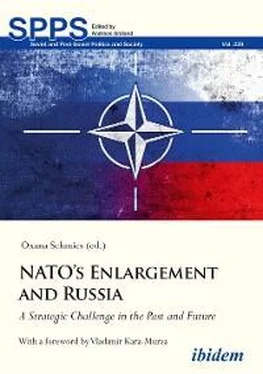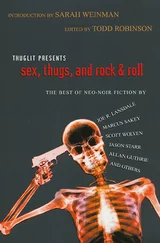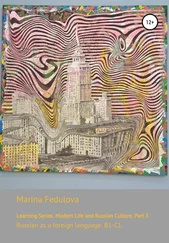With its three main parts, each anchored both in the past and the present, this collected volume seeks to achieve a better understanding of the NATO enlargement processes of the 1990s, Russia’s place in them, the policy followed and negotiation practices, as well as the underlying thinking of its main actors.
Alexey Arbatovstarts with a comprehensive survey of the issues of strategic stability and nuclear deterrence after the Cold War, and delves deeply into the historical origins of the current security dilemma. A profound understanding of the role of nuclear deterrence, strategic stability, nuclear disarmament, and nonproliferation are indispensable for the survival of human civilization. Nuclear weapons play today, to be sure, a predominantly political role, rather than a military one. Nevertheless, the state of relations between NATO (as, among others, a nuclear alliance) and Russia by early 2021 causes considerable alarm. 13
John Kornblum, a direct participant of many basic international negotiations between Russia and NATO and one of the authors of the NATO-Russia Founding Act, highlights the “urgent necessity to act” in today’s world. He makes readers aware of the historical lessons from the Quadripartite Agreement which began the European security conference project. Kornblum’s chapter draws attention to the changes faced by the incoming Biden administration and its Western allies, and the need for a new “Atlantic paradigm” in the digital era. It expresses his hope that democracy and democratic values will remain the “operating system” of this paradigm.
Liviu Horovitzbases his analysis of the NATO enlargement process on newly declassified archival documents. He argues that the role of idiosyncratic motives of particular Western governments during the enlargement processes of the 1990s has been underestimated. The commonly held assumption that NATO enlargement was a Western expansion to Eastern Europe, which exploited Russia’s weakness, continues to dominate. Horovitz reconstructs British internal deliberations between the Foreign and Commonwealth Office (FCO) and the Prime Minister’s Office. He reveals a desire for securing America’s place in Europe as the main motive of the British actors in the 1990s.
Steven Pifer offers an exceptionally deep insight into the Bill Clinton’s Administration’s hopes and aspirations after German reunification and the breakup of the Warsaw Pact. He traces three main tracks in “reshaping Europe,” including the evolution of relations of the US with former Warsaw Pact members, building a relationship between NATO and Russia, and the creation of a partnership between NATO and Ukraine. Pifer provides reflective criticism of all three of these tracks.
Marcin Zaborowski provides a historical overview of the external (predominantly Russian) influence on the nations of East-Central Europe. He explores their attitudes and threat perceptions, as well as resulting defense acquisition policies and defense spending decisions along NATO’s “Eastern Flank.”
Andreas Heinemann-Grüderanalyzes “realist” offensive and defensive narratives of Russia’s actions towards Ukraine after the annexation of the Crimea. NATO’s enlargement often serves as a determining factor within these narratives, a conscious or unconscious provocation by the West, or even a self-fulfilling prophecy. These findings underline the interrelation of NATO and Russia, as well as the blind spots associated with the Alliance’s enlargement. Heinemann-Grüder provides a detailed examination of NATO-Ukraine relations and a prognosis for both Brussels and Kyiv based on the lessons learned from the Russian-Ukrainian War.
Mariana Budjerynand Andreas Umlandaddress in their contribution the security assurances that Kyiv received in 1994, from the United States, United Kingdom and Russian Federation, in exchange for Ukraine’s signature under the 1968 Nuclear Non-Proliferation Treaty (NPT) and atomic disarmament. They argue that Russian actions towards Ukraine since 2014 have been profoundly undermining the rationale of the entire international nonproliferation regime.
Pavlo Klimkin, a former Ukrainian foreign minister, explores, in a brief interview with the editor, the Ukrainian position on various questions of Ukraine’s international relations. He touches the 1994 security guarantees to Kyiv and their remaining political value, the Ukrainian perception of the “transatlantic community of values and convictions,” Ukraine’s strategic goals for the years to come, the lost and real chances for successful security treaties, and Ukrainian hopes for a future transatlantic partnership.
Gleb Pavlovsky, a former adviser to Vladimir Putin, offers an exclusive view on the thinking within the Kremlin—and what’s behind it. Pavlovsky provides a detailed analysis based on the sophisticated concept of “unconscious decentering.” He lays out how the Russian leadership (including, presumably, the President of the Russian Federation himself) assesses world relations and Russia’s role in them. He shows what the Kremlin is betting on in the realm of security issues and allows the reader to draw her/his own conclusions on the risks involved. His valuable insight provides crucial keys to a better understanding of the thinking of the Russian leadership.
Roderich Kiesewetter,a German politician representing the largest party in the governing CDU/CSU coalition, offers his views on the security architecture that has emerged since the 1990s. He argues that there was and is a lack of clearly defined Western strategic goals for NATO-Russia relations. However, Russia too “was equally incapable of defining such a vision itself” in the 1990s, according to Kiesewetter. This situation reminds of the current state of affairs. Kiesewetter examines obstacles hindering Western efforts towards promotion of democracy today and makes suggestions for the German policies towards Eastern Europe.
Łukasz Adamskiexplores the question of the perception of Russian foreign and security policy by the West and its political implications. He scrutinizes the fallacies underlying Western perceptions of Russian thinking and their possible resolution.
Michail Mironjukand Dmitrij Stefanovicexamine the reasons for distrust in Russian-Western relations, and focus on the role of military issues from a Russian perspective. This contribution helps to make the official Russian view on current security policies better understandable.
Reiner Schwalb draws on his long practical experience in Moscow when analyzing Russian programmatic military documents as well as Russian power structures (siloviki). 14He also elaborates on some concrete proposals for Germany’s future Eastern policy, including the field of military cooperation.
The volume contains a multifarious mixture of analytical reflections, competing interpretations and policy recommendations that can help to elaborate a more effective Western strategy towards Russia. The appearance of this collection is also an expression of the readiness of foreign policy experts from Russia, Poland, Ukraine, Germany and the USA to openly discuss and fundamentally reevaluate some burning security issues. This collection unites analysts with very different backgrounds and viewpoints within one volume. Hopefully, the book will thus serve as a forum upon which more fruitful future dialogue can be build.
My sincerest thanks go first and foremost to Marina and Alexander Stuppo. In addition, I am very grateful to Alexander Ebner, Joerg Forbrig, Andreas Umland, Robert Enz, Gabriele Metzler, Johannes Varwick, Marcus Pindur, Vladimir Kara-Murza, Peter Hoeres, Anatoliy Adamishin, Lilia Shevtsova, Ulrich Schlie, Daniel Hamilton, Kristina Spohr, Joseph Verbovszky, and Dominic Kahn for giving strength, providing a necessary word in a necessary moment, as well as for offering their support, wisdom, knowledge, encouragement and advice.
Читать дальше












